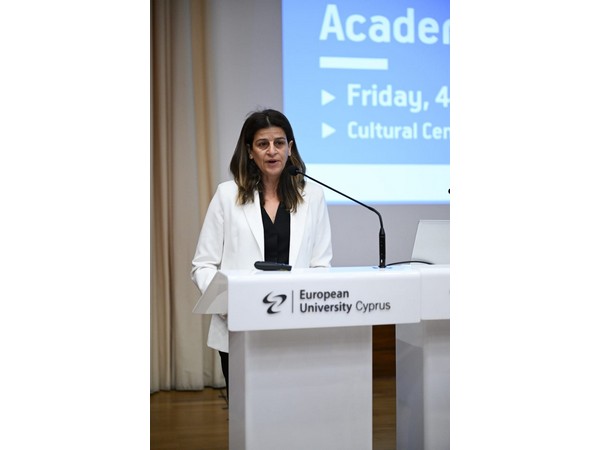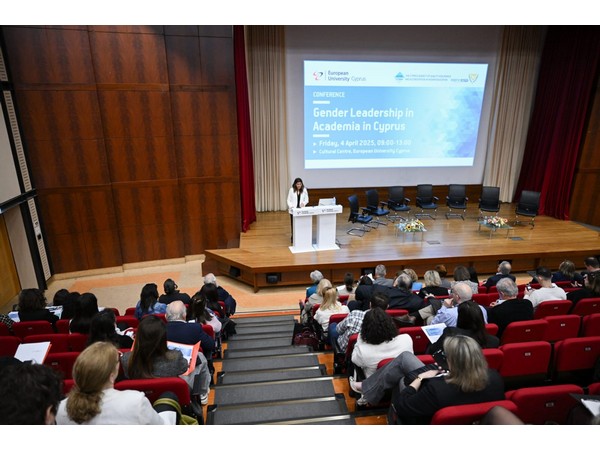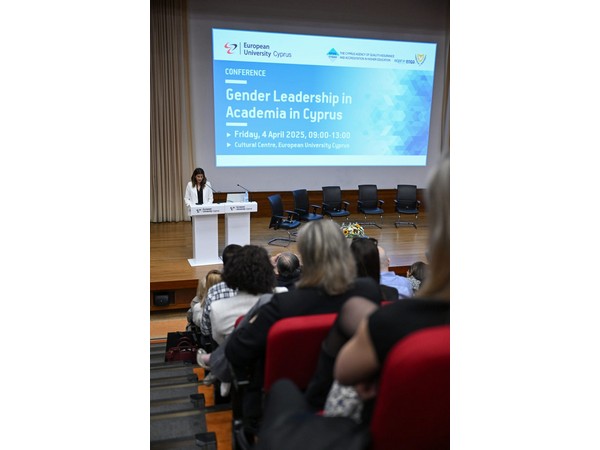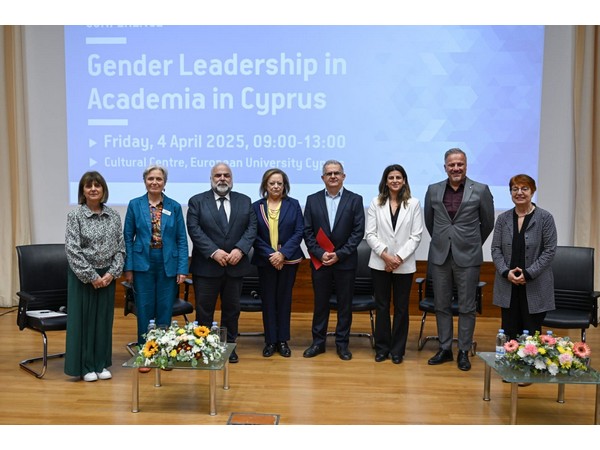Press Releases
04-04-2025 12:27
Address by the Commissioner for Gender Equality, Ms Josie Christodoulou, at the Conference on Gender Leadership in Academia
I would like to congratulate the European University Cyprus (EUC) and the Cyprus Agency of Quality Assurance and Accreditation in Higher Education (CY.Q.A.A.) for organising today’s conference. Thank you for putting together this important event to address an issue that is crucial for the future of our society: gender equality in higher education and leadership.
Despite remarkable progress in many areas, gender disparities persist in all spheres of activity, including academia. These disparities are not only limited to access to education, but extend into leadership roles, academic recognition and pay equity. According to the 2024 EU- SHE Figures Report, women hold 30% of top academic positions even in fields where they are typically well-represented, such as Humanities, Arts, and Social Sciences, where women comprise just 34% of top academic staff.
Leadership, in academia and beyond, is a cornerstone of progress. When we talk about leadership, we are not merely referring to titles or positions of power. True leadership is about setting the direction, inspiring others, and creating opportunities for all. Unfortunately, many women still find themselves excluded from leadership roles in academia.
Whether this is due to (un)conscious biases, structural barriers, or societal expectations, glass ceilings and sticky floors, women often face challenges in ascending to positions where they can make decisions that affect the trajectory of academic institutions and society as a whole.
The lack of gender parity in leadership roles within academia is not just an issue of fairness or equality - it is a matter of intellectual, social and economic advancement. Research has shown time and again that diverse leadership teams produce better results, are more innovative, and foster environments that are conducive to creativity and progress. The time is now to break down the barriers that prevent competent and talented women from rising to the top and contributing to the academic community in ways that will benefit everyone.
One of the key challenges we face in our effort to promote women’s leadership in all areas is the persistence of gender stereotypes and implicit biases. These biases affect both women and men and shape the way we perceive leadership. Leadership qualities are mostly associated with traits such as assertiveness, competitiveness, and decisiveness that are perceived as “masculine”, while women are expected to demonstrate nurturing, emotional and supportive behaviors, that are less associated with leadership and create a challenging dynamic for them, especially when they attempt to climb the ladder or assert their authority in male-dominated fields.
It is therefore crucial to work towards breaking these stereotypes and creating an environment where leadership is defined by ability and vision. However, what we experience, what we expect to see is men to lead and women to follow.
Challenging and eventually changing this patriarchal system to a more equitable and equal, human centred system is perhaps the biggest challenge before us, not only in academia but in all spheres of activity.
Promoting gender equality and women’s equal participation and leadership in all areas of activity is a horizontal priority of President Christodoulides’ government. Last July, the Office of the Commissioner for Gender Equality was established by law, reflecting its upgraded, guiding and coordinating role in the effort to achieve full and substantial gender equality in Cypriot society. Through the National Strategy for Gender Equality, we strive to establish equality between men and women on all levels. One of the main aims of our strategy is equal participation and representation of both women and men at all levels, including in decision making. To achieve the aim, we follow a holistic and horizontal approach to create a gendered environment using the tool of gender mainstreaming in our strategy.
The strategy is the result of cooperation and consultation with all ministries, deputy ministries, the National Machinery for Women's Rights, civil society, employers' organisations, trade unions and academic institutions. It was formed on the basis of a participatory process with all stakeholders and of course on the basis of national, European legislation and policies, as well as international conventions and guiding documents, such as the Beijing Platform for Action and the United Nations Convention on the Elimination of All Forms of Discrimination against Women. The Strategy came into force in January 2024. Our office coordinates, monitors and evaluates its implementation in cooperation with all ministries and deputy ministries.
For its successful implementation, Gender Equality Officers have been appointed in all Ministries and Deputy Ministries, with whom we coordinate for the implementation of targeted policies, measures and actions. Bearing in mind the important role of civil society in the implementation of the Strategy, there is continuous cooperation and consultation with the National Machinery for Women's Rights and the broader civil society and social partners.
Dear friends,
I will highlight just a few examples of horizontal policies and actions that have already been implemented or whose implementation is imminent.
- Gender-responsive budget: With a view to achieve gender-equitable allocation of public resources and with EU assistance and training we aim to put together a gender-responsive state budget by applying gender mainstreaming on all levels of state budgeting. This means that decisions on any political, administrative or other action, included in the budget will take into account their different impact on men and women. The implementation of the project will be based on existing statistics relating, among others, to the workforce and the gender pay and pension gap, as well as on statistics that are continuously developed within the framework of our Strategy.
- Promoting women’s leadership: We are proceeding with the transposition into our national law of the European Directive on the balanced participation of women and men in management positions and on the boards of directors of companies listed on the stock exchange by amending the Companies Law. The process has begun and sets as a target that the underrepresented sex should constitute 40% of non-executive directors and 33% of all directors.
- Our annual essay-writing contest, titled “What I would change if I were a minister for a day” is addressed to female third year students of public, private and technical lyceums and aims at enhancing women’s leadership and representation in decision making processes. Winners become shadow ministers for a day.
- For equality in labour and the reduction of the pay gap, our Office, in collaboration with the Cyprus Chamber of Commerce and Industry (CCCI), prepared an action plan with good practices, in the form of recommendations, covering, among others, internal governance, remuneration and recruitment and promotion procedures. The action plan is addressed to private companies.
- Aiming to empower women in rural areas, we recently launched digital education programs for these women. Digital education opens up new possibilities for them as it removes geographical and social barriers, while providing them with the opportunity to acquire new knowledge, network and connect with the broader digital and business ecosystem. Through these programs their financial independence, entrepreneurship and leadership are strengthened.
- Education and Awareness are important parametersin our effort to deconstruct stereotypes and biases and eliminate gender-based inequalities and discrimination. We believe that this effort must start early on, from school. From this year, school career advisors receive special training so that they can guide children in choosing a professional path based on their skills rather than not on gendered stereotypical roles imposed by society. The aim is to promote the equal participation of both women and men in all sectors.
- Through our thematic campaigns under the umbrella title “Her Story”, we present success stories of women leaders in male dominated fields, who serve as role models for young women to follow in their footsteps. In 2023, the campaign was dedicated to women in STEAM fields, followed by the “women in shipping” campaign, last January.
- Reconciling personal, family and work life: Addressing the issue of life-work balance and time availability for women, amongst other measures, the extension of maternity leave to 22 weeks, the increase of care structures for children and the elderly through the EU’s Recovery and Resilience Facility (RRF), and the introduction of compulsory pre-primary education from the age of 4, will add in the effort of equal participation in the labour market.
- Gender has also been mainstreamed in the tax reform proposals that the government put forth last February. For example, the tax relief proposals for both parents in the case of families, based on the number of dependent children and students, and the proposal to grant single-parent families the same relief that would apply to families with two parents, are measures that encourage women to participate more actively in the labour market. At the same time, they contribute to a higher standard of living of women and their families.
- Research and innovation are important tools in our effort to promote gender equality. In addition to the digital education programs for women in rural areas which I mentioned earlier, we are also conducting various studies in cooperation with the Statistical Service and universities, which help us form targeted policies. A study aiming to map representation and document the needs, requirements and possible barriers to employment in shipping has recently been completed, the findings of which are expected to form suitable policies and actions towards the creation of a gender-responsive workplace. Another study on the different impact of energy policies on women and men has also been completed and will assist us in designing more gendered energy policies.
As I mentioned, research and innovation are important in our effort to achieve gender equality but equally important is promoting gender equality in the field itself. The enhanced participation of women in research, such as in artificial intelligence systems’ development teams, can lead to the identification of specific social needs, which may not be easily distinguishable by groups with insufficient female representation, and to the promotion of targeted programs to meet them.
Dear friends,
Universities and academic institutions have historically been part of change, of innovation and forward looking. Within this framework we count on universities to take concrete steps to ensure that their policies, practices, and cultures are inclusive and supportive.
This includes promoting work-life balance, addressing the gender pay gap, providing equal access to professional development opportunities, and ensuring that women are well-represented in decision-making bodies.
We must also address and ensure that harassment and discrimination have no place in academic spaces, and that institutions are held accountable for maintaining safe and equitable environments for everyone.
In closing, I would like to stress that gender equality in academia is a shared responsibility of all and hence requires a collective effort. Together, we must challenge biases and advocate for change at every level. We must create environments where women can not only participate but lead, and where their contributions are valued and celebrated.
We are at a critical juncture in history, and the choices we make today will shape the future of academia and society for generations to come. Let us work together to build a world where gender no longer dictates one’s ability to lead and achieve, where every individual has an equal opportunity to contribute to the advancement of knowledge, and where equality between women and men is celebrated as a strength rather than a challenge.
I look forward to the presentation of the findings of the national survey on “Gendered leadership in an academic environment in Cyprus” and the discussions that will follow.
Thank you.
(ΑΑ/ΙΑ)
Relevant Press Releases

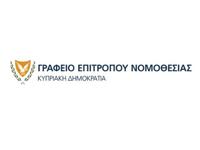
05-03-2025 12:58
New Publications by the Office of the Law Commissioner

05-03-2025 12:55
New Publications by the Office of the Law Commissioner
